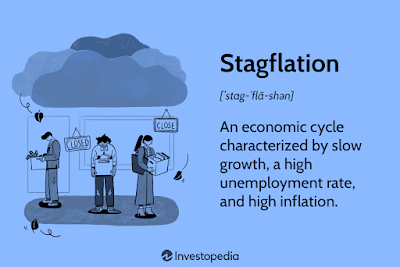Today's inflation figures show that the UK economy is a basket case.
-Inflation (CPI) unchanged at 8.7% in the 12 months to May 2023.
-CPI rose 0.7% in the month.
-Core CPI rises in May to 7.1% from 6.8%.
-Highest reading since 1992.
Higher prices for air travel and recreational goods and services were a key contributor to inflation over the month.
Food and non-alcoholic beverage inflation 18.4%, eased slightly from 19.1%
Inflation had been expected to fall to 8.4% year on year.
Why is inflation hitting the UK so hard?
1 The billions spunked up the wall on Covid
2 The Covid lockdowns that wrecked the economy
3 The ever useless Bank of England failing to raise rates early enough to stave this off
4 The war in Ukraine causing a spike in energy prices etc
All of this means that the UK is nnow facing the prospect of several years of stagflation.
Stagflation is a combination of high inflation and slow economic growth. It is a very difficult economic environment to manage, and it can have a devastating impact on businesses and households.
These factors are all combining to create a perfect storm for stagflation in the UK. If inflation continues to rise and economic growth stalls, the UK economy will be in for a very difficult period.
The impact of stagflation will be felt across the economy. Businesses will face higher costs, which would make it more difficult for them to stay profitable. This will lead to job losses and a slowdown in economic activity.
Higher inflation will eat into disposable incomes, making it harder for them to afford essentials. This will lead to a decline in living standards and a rise in poverty.
The government would also face a number of challenges if stagflation were to hit the UK economy. It would need to find ways to support businesses and households, while also trying to control inflation. This would be a very difficult balancing act.
The threat of stagflation is a serious one for the UK economy. It is important that the government and businesses take steps to mitigate the risk. This includes finding ways to reduce energy dependence, supporting businesses to become more energy efficient, and investing in infrastructure.
If the UK is able to avoid stagflation, it will be a major achievement. However, the risk remains, and it is something that businesses and households need to be aware of.
What can you do to prepare for stagflation?
There are a number of things that you can do to prepare for stagflation, including:
- Increase your savings. This will give you a buffer in case your income falls or your expenses rise.
- Pay down debt. This will reduce your monthly outgoings and make you more resilient to financial shocks.
- Invest in assets that are likely to hold their value in stagflation, such as gold or property.
- Diversify your income streams. This will reduce your reliance on a single source of income.
- Make sure you have a financial plan in place. This will help you to stay on track financially, even if the economy takes a turn for the worse.
Stagflation is a serious economic challenge, but it is not insurmountable. By taking steps to prepare, you can reduce your risk and protect your financial future.
Tax Investigation Insurance
Market leading tax fee protection insurance for businesses, sole traders and individuals. Protect yourself from accountancy fees in the event of an HMRC enquiry.
Having a Solar Protect Tax Investigation Insurance policy at your disposal means that should you be one of the many 1000's of businesses or individuals that are selected by HMRC each year to look into your tax affairs your own accountant (your tax return agent) can get on and defend you robustly.
You have the peace of mind knowing that your accountant's (your tax return agent) fees will be paid by the insurance without any Excess for you to find.
Tax Investigation Insurance is an insurance policy that will fully
reimburse your accountant's (your tax return agent) fees up to £100,000
if you are subject to enquiry by or dispute with HMRC.
A Solar Protect policy will enable your accountant (your tax return agent) to:
-
Deal with any correspondence from HMRC
-
Attend any meeting with HMRC
-
Appeal to the First-tier Tribunal or Upper Tribunal
-
Having the security of knowing that fees will be met in full will
enable your Accountant (your tax return agent) to defend your position
robustly
Please click here for details.










